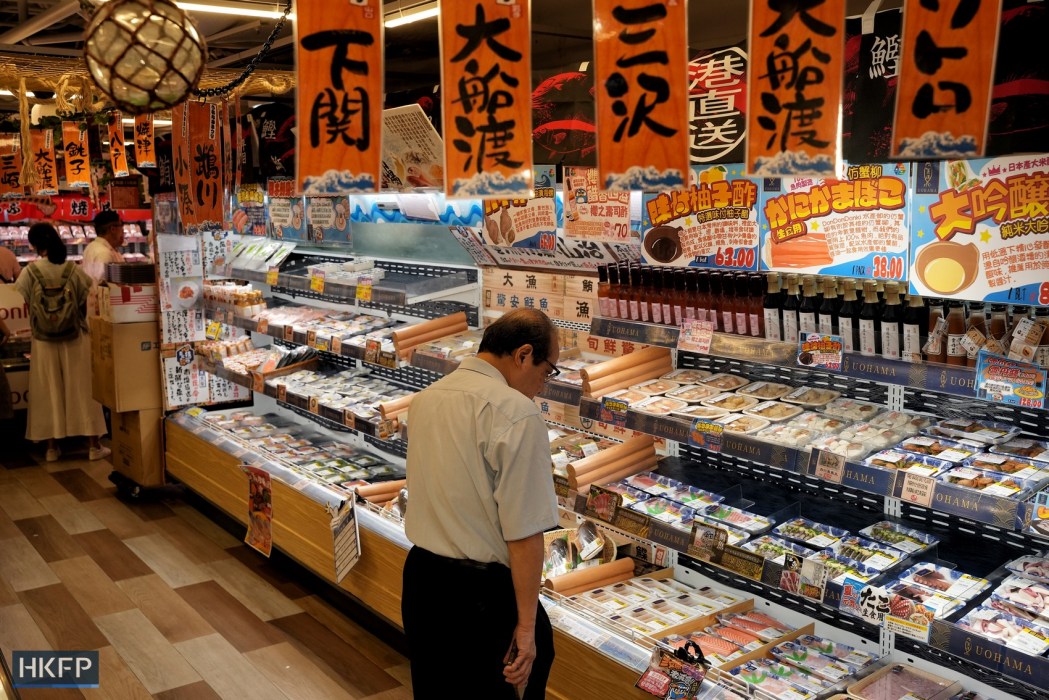Hong Kong is to impose an indefinite ban on seafood imports from 10 Japanese prefectures starting on Thursday as the Fukushima power plant discharges treated wastewater into the sea.
The “precautionary measure” is to make sure all seafood imports to Hong Kong are safe, Secretary for Environment and Ecology Tse Chin-wan said on Tuesday, adding that the government will monitor radiation levels to determine how long the ban will last.

Early last month, the International Atomic Energy Agency (IAEA) granted Tokyo approval to release treated water stored at the disabled Fukushima Daiichi nuclear power station into the sea. Following a 9.0 magnitude earthquake and tsunami in 2011, the plant suffered major damage. Beijing and Hong Kong have expressed “strong opposition” to the wastewater discharge.
“At this point in time, we do not have a timetable of how long the prohibition will last, ” Tse said in Cantonese as he met the media.
When asked about how the government will help affected Japanese restaurants, he said: “In order to help the restaurants, I think the best thing to do is to assure the people of Hong Kong that all food allowed to be imported to Hong Kong is safe.”
The prohibition encompasses all seafood from 10 regions including Tokyo, Fukushima, Chiba, Gunma, Tochigi, Ibaraki, Miyagi, Niigata, Nagano, and Saitama. This ban applies to all forms of seafood, including frozen, chilled, dried, or that which is stored in any other manner.

Representatives from the restaurant industry have been raising concerns over the past two months, urging the government to introduce measures to help Japanese eateries.
According to HK01 last month, Martin Chan – a member of the board of directors of the Hong Kong Federation of Restaurants & Related Trades – said that Japanese restaurants will see an estimated 50 per cent drop in revenue after the ban is imposed, and 20 to 30 per cent of restaurants will close down if the prohibition last for two to three months.
Chan said 80 to 90 per cent of all exports from Japan to the world transit via Tokyo, urging the government to make it clear if seafood coming from other Japanese regions – via Tokyo – are exempt from the prohibition.

HKFP has reached out to the Environment and Ecology Bureau for a response.
Inter-departmental task force
Officials from the environmental bureau and four other departments told the media on Wednesday afternoon that they had established an inter-departmental task force to monitor food safety amid the wastewater row.
Vivian Lau, permanent secretary for environment and ecology, said the Agriculture, Fisheries and Conservation Department will monitor the radiation levels of fisheries in Hong Kong waters.
Meanwhile, the Centre for Food Safety, operating under the Food and Environmental Hygiene Department, will provide updated test results on the radiation levels of food imported from Japan on its website. Whilst the Hong Kong Observatory will enhance its monitoring on radiation levels of Hong Kong waters.
Pro-establishment protests
Also on Wednesday, local pro-establishment parties protested against Japan’s actions. The Democratic Alliance for the Betterment and Progress of Hong Kong, the city’s largest pro-Beijing party, held a petition at the front of the Consulate-General of Japan condemning the “irresponsible move” to release wastewater.

The Hong Kong Federation of Trade Unions also protested at the front of the Consulate-General on Tuesday, accusing Japan of endangering global food safety.
‘Negligible impact’
In July, the IAEA published a report reviewing the safety of the treated wastewater. “The discharges of the treated water would have a negligible radiological impact to people and the environment.”

Kenichi Okada, who heads the Japanese consulate in Hong Kong, told Now TV in an interview earlier this month that Japan will not adopt “tit-for-tat” measures if Hong Kong imposes bans on its food imports after the discharge, adding that Hong Kong’s reputation in Japan has been poor since the protests and unrest of 2019.
“Japan is not a country which engages in illogical, nasty tit-for-tat. But what I’m worried very seriously [about] is the image of Hong Kong in Japan,” Okada said .
“As I have said, our objection to the discharge plan remains. That’s why I am here, ” Tse said on Tuesday when asked how Hong Kong will navigate its relationship with Japan.
Support HKFP | Policies & Ethics | Error/typo? | Contact Us | Newsletter | Transparency & Annual Report | Apps
Help safeguard press freedom & keep HKFP free for all readers by supporting our team

LATEST FROM HKFP
HKFP has an impartial stance, transparent funding, and balanced coverage guided by an Ethics Code and Corrections Policy.
Support press freedom & help us surpass 1,000 monthly Patrons: 100% independent, governed by an ethics code & not-for-profit.











